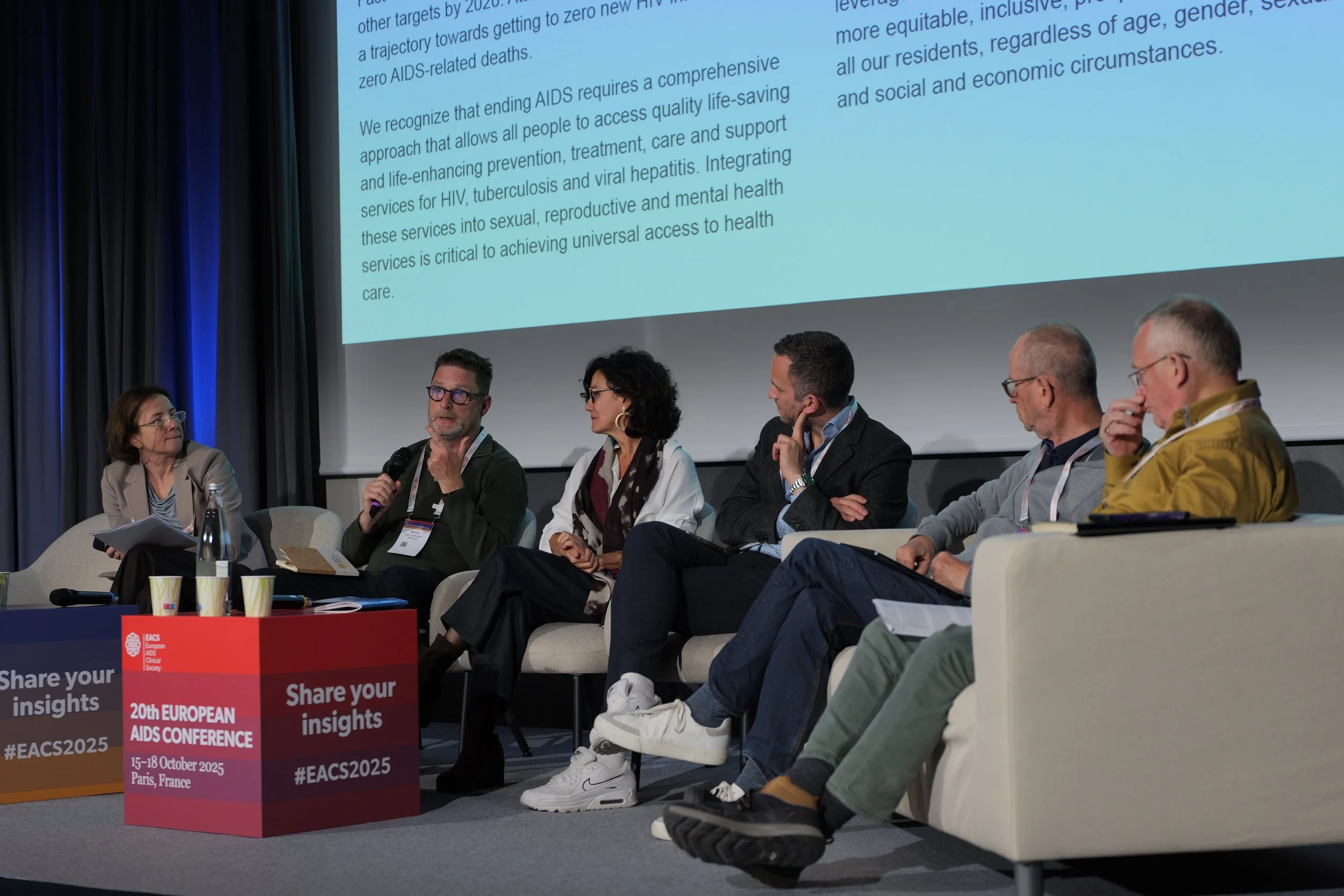Nominera till Hiv-Sveriges styrelse 2026
Är du nyfiken av dig och vill tillhöra en härlig gemenskap för att skapa ett bättre samhälle i frågor som berör personer som lever med hiv?
Då är det dags att nominera dig eller någon du känner till Hiv-Sveriges styrelse. Ledamöter väljs på två år och suppleanter väljs på ett år.
Valberedningen söker dig som:
- Lever med hiv, men även dig med anhörigperspektiv.
- Du får gärna ha tidigare erfarenhet av styrelsearbete.
- Ha ett intresse av att utveckla dina kunskaper om hiv och organisationsutveckling.
Har du särskild kompetens, erfarenhet eller sakkunskap inom ett eller flera områden, exempelvis ekonomi, arbetsmiljö, HR, juridik, kommunikation eller andra områden? Skriv gärna det i formuläret nedan.
Styrelsens möts fysiskt några gånger per år men arbete bedrivs till stor del genom digitala möten och vi välkomnar nomineringar från hela landet.
Hiv-Sveriges årsmöteshelg mars 2025.
Skicka din nominering genom att fylla i formuläret nedan. Du kan både nominera dig själv eller någon annan.
Med vänlig hälsning,
Hiv-Sverige
Framtidens hivarbete - Tre insikter från European AIDS Conference 2025
Mellan den 15-18 oktober samlades forskare, vårdpersonal, beslutsfattare och civilsamhällesorganisationer i Paris för den 20:e europeiska aidskonferensen (EACS), med tema “From science to implementation”.
EACS 2025 bjöd på ett brett spektrum av ämnen; från EACS uppdaterade riktlinjer till framtidens hiv-behandling, samsjuklighet och artificiell intelligens (AI). Hiv-Sverige var på plats för att ta del av och dokumentera ny kunskap. Här delar vi insikter kring de tre områden som stod i centrum under årets konferens.
Beredskap och finansiering - vilka utmaningar står vi inför?
Med fem år kvar till UNAIDS 2030-mål, uttryckte flera forskare under konferensen att världen riskerar att missa de globala målen. Vi fick ta del av möjliga framtidsscenarier som visar vilka effekter politiska beslut kan få för hiv-prevention, behandling och framtida beredskap.
Under föreläsningen “Five years left! What targets are in reach in Europe and which will we struggle to make?” betonade Teymur Noori från ECDC att Europa riskerar att missa flera av UNAIDS mål för 2030. En tredjedel av länderna når i nuläget inte de övergripande 95-95-95 målen och skillnader i tillgången till PrEP mellan länder kvarstår. Med 17,4 % utan tillgång inom EU är det osannolikt att PrEP målet nås.
Nedmonteringen av USAID och upphävandet av flera biståndsprogram, inklusive PEPFAR, nämndes under öppningsceremonin som en stor utmaning för det globala hiv-arbetet. PEPFAR finansierar prevention, som PrEP, testning, samt antiretroviral behandling (ART) för cirka 20 miljoner människor som lever med hiv, i 55 länder.
En modell från UNAIDS presenterades under konferensen som visade att en fullständig avveckling av PEPFAR mellan 2025 och 2029 kan leda till ytterligare 6,6 miljoner nya hiv-infektioner och 4,2 miljoner aidsrelaterade dödsfall. Öppningsceremonin gästades av Paris borgmästare Anne Hidalgo, som betonade att hiv-arbetet inte kommer att brista på grund av en brist evidens eller kunskap utan att valet för hälsa kommer att bli ett politiskt val.
“The choice for health will be a political choice” Paris borgmästare, Anne Hidalgo
Dolutegravir (DTG) är idag WHO:s förstahands rekommenderade läkemedel vid hiv-behandling. En begränsad tillgång till ART riskerar att personer som lever med hiv kan tvingas avbryta eller fördela sin behandling i lägre doser än effektivt. En epidemiologisk modellstudie visar att dolutegravir-resistens kan komma att öka avsevärt mellan 2020-2035, och under panelsamtalet ART now & near lyftes det att “det inte är en fråga om resistens kommer att uppstå - utan när”.
Frågan ”Kan vi gå tillbaka till det gamla normala, eller måste vi acceptera ett nytt annorlunda?”, ställdes av moderatorerna under diskussionen kring beredskap. Även frågan om Europa kan leda vägen framåt lyftes under konferensen.
BE READY now, ett tioårigt europeiskt partnerskap för pandemiberedskap med start 2026 presenterades. Syftet med partnerskapet är att etablera ett europeiskt forsknings och innovations system för att stärka EU:s beredskap och kapacitet att hantera framtida hälsokriser orsakade av infektionssjukdomar.
Beredskap och finansiering är till stor del en fråga om politiska prioriteringar. Skiftet i den globala hälsopolitiken tyder på att vi, även här i Sverige, behöver tänka på och förbereda oss för framtida kriser. Hiv-Sverige publicerade i februari 2025 broschyren “Om hiv när krisen eller kriget kommer”. Broschyren visar att vi redan idag behöver förbereda oss, tänka, prata om, och planera för scenarier som kan komma att bli verklighet. Du kan läsa den här.
Samsjuklighet och behoven hos äldre som lever med hiv
År 2030 beräknas majoriteten av alla som lever med hiv vara över 50 år, något som redan är verklighet i Sverige. De medicinska framstegen med antiretroviral behandling har gjort att personer som lever med hiv har en förväntad livslängd som befolkningen i stort. Forskning visar samtidigt att personer som lever med hiv åldras fortare och har en ökad risk för samsjuklighet.
Det är fortfarande oklart hur mycket hälsoutmaningarna beror på normalt åldrande jämfört med hivrelaterad påverkan. Under konferensen betonades vikten av personcentrerad vård som ser hela individen, inte bara hiv-diagnosen. En viktig insikt från konferensen kring hiv och åldrande är att frågan om personer som lever med hiv åldras fortare behöver förstås i relation till vem och jämförelse till vad.
Den senaste versionen av EACS Guidelines 13.0 (2025) tar fram uppdateringar och riktlinjer som bygger på ett helhetsperspektiv med fokus på hälsofrämjande insatser. Prioriterade områden inom samsjuklighet är sömn, substansbruk, viktuppgång, fetma och psykisk hälsa.
Nytt är även att viktuppgång och fetma inte längre definieras enbart utifrån BMI, utan även utifrån kroppsfett. Då ART-behandling kan bidra till viktuppgång rekommenderas numera livsstilsförändringar och farmakologiska metoder framför att byta ART. Under konferensen väckte statiner stort intresse; sammantaget enades man om dess betydelse, men uppfattningarna om hur behandlingen bör läggas upp skilde sig åt.
ECDCs rapport (2024) visar på ett akut behov av att motverka hiv-relaterat stigma och diskriminiering inom vårdmiljöer. Rapporten visar att mindre än en tredjedel av vårdpersonal i Europa hade korrekt om grundläggande fakta kring hivöverföring och prevention (U=U, PEP, PrEP).
I Sverige saknas ännu riktlinjer för screening av sjukdomar där personer med hiv har ökad risk samt hur kunskapen om hiv och samsjuklighet ser ut hos de som möter äldre personer med hiv. Hiv-Sverige ser att vidare undersökningar och kartläggningar utanför den specialiserade vården behövs för att äldre personer som lever med hiv ska få fler friska år och känna att deras behov blir mötta.
Framtidens hiv-vård
”Om vi kan erbjuda en behandling en gång per år i stället för varje dag – vad skulle det betyda för följsamhet, livskvalitet och stigma?”, frågade en av deltagarna i publiken under föreläsningen ART now & near.
Framtidens hiv-behandlingar rör sig mot färre doser och längre intervall såsom veckovis, månadsvis och årlig dosering vilket kan förenkla doseringen och förbättra följsamheten.
Vid IAS-konferensen 2024 presenterades läkemedlet lenacapavir, som kan ges som injektion två gånger per år. Flera studier under EACS 2025 visar hur olika regimer och kombinationer med läkemedlet lenecapavir kan användas som en optimerad behandling och som ett alternativ till dagligt oralt PrEP.
Under EACS 2025 presenterades nya resultat från en fas-1-studie där lenacapavir testades som årlig injektion, med goda resultat. Både formuleringarna av lenacapavir som testades i studien var säkra och väl tolererade av deltagarna. Vidare forskning krävs, men datan visar på potentialen för biomedicinsk hiv-prevention med ett doseringsintervall på ett år.
Samtidigt pågår forskning kring helt nya vägar för framtida kompletterande eller alternativa behandlingar för hiv. Xianging Bai’s forskning (2025) fokuserar på sambandet mellan hiv-kontroll och tarmfloran. Forskningen visar intressanta resultat på hur vissa personer med hiv kan kontrollera viruset utan behandling. En särskild dipeptid hos dessa personer (elite controllers), visar sig ha en hämmande effekt på hiv. Resultaten ökar vår förståelse för tarmens bakterier och virus (bakteriomet och viromet) och undersöker om vissa nya bakterier kan bidra till ett immunologiskt eller direkt skydd mot hiv.
Även artificiell intelligens (AI) diskuterades under konferensen med fokus på hur AI kan bidra till framsteg inom hiv-prevention, behandling och vård. Tetiana Deshko presenterade TWIIN projektet, ett AI-baserat verktyg för att förstärka hiv-vården under det pågående kriget i Ukraina.
En unik aspekt av TWIIN är användningen av digitala människor som genererats av riktiga personer. Testa TWIIN här: https://twiin.aph.org.ua/en/
Forskningen som presenterades under "How can AI be used to advance in HIV prevention, treatment and care?" visade på nya innovativa sätt att använda AI inom hiv-arbetet men att: “AI tools must be overseen by humans and future research is needed in terms of cultural appropriateness and health literacy”.
Referenser
European Commission, “BE READY NOW - EUROPEAN PARTNERSHIP FOR PANDEMIC PREPAREDNESS” https://cordis.europa.eu/project/id/101226682
Deshko T. AI use in HIV prevention, case finding and early treatment uptake in Eastern Europe and Central Asia. 20th European AIDS Conference, Paris, session PS10, 2025.
Loosli, Tom et al. Predicted dolutegravir resistance in people living with HIV in South Africa during 2020–35: a modelling study. The Lancet Global Health, Volume 13, Issue 4, e698 - e706
Suarez-Zdunek MA, Knudsen AD, Hove-Skovsgaard M, MacCann R, Kenny G, Ostrowski SR, Benfield T, Fuchs A. PS03.2 | Immune-inflammatory profile with inflammation, innate activation, and endothelial dysfunction in people with HIV is associated with obstructive coronary artery disease.
Hiv-Sverige officiell partner till EMSEX
Hiv-Sverige har officiellt undertecknat avsiktsförklaringen för att bli en officiell partner till EMSEX – Erasmus Mundus Master i Sexologi. EMSEX ett gemensamt initiativ av Universitet Lusófona (Portugal), Universitet de Almería (Spanien) och Malmö universitet (Sverige).
EMSEX-masterprogrammet erbjuder en integrerad internationell utbildning om 120 Hp över 4 terminer, med en transdisciplinär och tvärvetenskapliga ansats för vetenskapliga studier av mänsklig sexualitet. Programmet vill lyfta den akademiska utbildningen inom sexologi på europeisk nivå och främja nationell och tvärkulturell forskning inom området mänsklig sexualitet.
Peer2Peer – ett nytt koncept för digitalt peerstöd
Idag, den 11 oktober 2025, lanserar Hiv-Sverige Peer2Peer, ett nytt koncept och verktyg för digitalt kamratstöd mellan personer som lever med hiv. Plattformen är framtagen som ett förslag på en långsiktig och effektiv lösning för att stärka tillgången till jämlikt stöd för personer med hiv i hela Sverige.
Varför Peer2Peer?
Inom vården erbjuds ofta samtalskontakt med kurator, men många efterfrågar även möjligheten att prata med någon som delar egna erfarenheter av att leva med hiv. Peer2Peer kompletterar vården genom att skapa en strukturerad form för peerstöd, där personer som lever med hiv kan välja vem de vill kontakta med hjälp av ett digitalt peergalleri, och där möten kan följas upp och kvalitetssäkras.
En hållbar lösning med stor potential
Peer2Peer visar på de digitala möjligheterna att tillhandahålla stöd oavsett bostadsort. Personer som lever med hiv kan själva välja vem de vill komma i kontakt med, vilket gör stödet mer individanpassat. Plattformen har också potential att nå dem som föredrar digitala möten eller saknar möjligheten att träffa andra med hiv i sitt närområde.
Peer2Peer är utvecklat och drivs av Hiv-Sverige i samarbete med de regionala medlemsorganisationerna Positiva Gruppen Syd och Positiva Gruppen Väst. Peer-mentorerna utbildas enligt Plusverkets metodbok och får kontinuerligt stöd och handledning för att säkerställa trygghet och kvalitet.
Nu öppnar vi Peer2Peer för användning. Vår förhoppning är att detta blir början på att systematiserat peerstöd börjar erbjudas i större utsträckning, och tillgängligheten ökar för alla som lever med hiv, oavsett var i Sverige de befinner sig.
Läs mer och ta del av Peer2Peer via: hivpeer.se
Hiv-Sverige deltar i MSBs Beredskapsveckan 2025
Myndigheten för samhällsskydd och beredskap (MSB) arranger i år Beredskapsveckan 2025 med temat “Du är en del av Sveriges totalförsvar. Hiv-Sverige deltar i initiativet och lyfter under Beredskapsveckan, som pågår mellan den 22 - 28 september 2025, rapporten “Om hiv när krisen eller kriget kommer”. Syftet med vårt deltagande är att synliggöra och medvetandegöra hiv i relation till beredskap, för att hiv ska tas på allvar i beredskapsarbetet.
I vår rapport “Om hiv när krisen eller kriget kommer” lyfter vi tre tematiska risker och anlägger ett antal framtidsscenarion. Läs gärna rapporten för att ta del av mer kunskap om hiv och beredskap. Tillsammans behöver vi bidra för att stå starka om något hotar oss.
Läs rapporten “Om hiv när krisen eller kriget kommer” här.
För att läsa mer om Beredskapsveckan 2025, besök msb.se.






